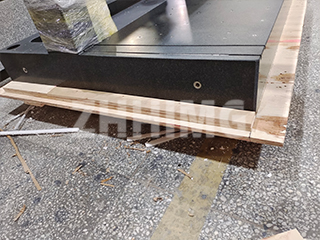Granite gantry components are essential in precision measurement and mechanical manufacturing, offering high stability and accuracy. These components are made from natural stone materials, specifically granite, which provides excellent durability and precision for industrial and laboratory measurement tasks. The following provides an overview of the composition, characteristics, and applications of granite gantry components.
Mineral Composition of Granite
Granite is a naturally occurring silicate mineral composed primarily of quartz, feldspar, and mica. The mineral content breakdown is as follows:
-
Quartz (20% to 40%): This mineral gives granite its hardness and strength, making it ideal for precision tools.
-
Feldspar: Enhances granite’s resistance to chemical weathering and adds to its durability.
-
Mica: Contributes to granite’s shine, offering both aesthetic appeal and improved structural integrity.
Granite’s crystal structure consists of large, uniform mineral grains arranged in a mosaic-like pattern. The crystals interlock in a regular or irregular manner, contributing to the overall stability and strength of the material. As granite contains more light-colored silicate minerals (such as quartz and feldspar) and fewer dark-colored minerals (like iron and magnesium), it generally has a lighter appearance. The color deepens when iron-rich minerals are present.
Precision and Accuracy in Granite Gantry Components
Granite gantry components are widely used in precision measurement, especially in environments that require the highest levels of accuracy. These components serve as ideal reference surfaces for checking the flatness and alignment of instruments, mechanical parts, and tools. The stability and rigidity of granite make it an excellent material for creating measurement tools that need to withstand heavy usage while maintaining precision.
Granite Gantry Components in Industrial and Laboratory Applications
Granite gantry components are designed to support high-precision tasks, making them essential for industries such as:
-
Mechanical manufacturing
-
Machine tools calibration
-
Electronics production
-
Laboratories where precise measurements are critical
Due to their natural characteristics, granite gantry components provide advantages over traditional materials, such as cast iron. Cast iron may deform over time, especially under heavy loads or temperature fluctuations, leading to loss of precision. In contrast, granite offers exceptional durability, resistance to deformation, and high stability under varying environmental conditions.
Applications of Granite Gantry Components
Granite gantry components are used in a variety of applications, including:
-
Precision measurement: Ideal for measuring the flatness and accuracy of machine parts, instruments, and tools.
-
Machine tool calibration: Provides a stable reference surface for checking machine tool alignment and operation.
-
Mechanical testing: Used as a test bed for various mechanical components, ensuring they meet the required specifications.
-
Workbenches and Fixture Stations: Granite gantry components are often used as workbenches for marking, measuring, welding, and tooling processes. Their high precision makes them indispensable in both manual and automated manufacturing processes.
In addition to these applications, granite gantry components are also used in mechanical testing platforms. Their ability to resist wear, corrosion, and deformation under stress ensures consistent performance even in demanding environments.
Why Granite Gantry Components are Superior to Cast Iron
Granite offers several advantages over traditional cast iron components:
-
Higher Precision: Granite maintains its precision over time and is less prone to deformation, making it ideal for high-precision measurements.
-
Stability: Granite is stable under varying temperatures and conditions, while cast iron may deform and lose accuracy over time.
-
Durability: Granite components are resistant to corrosion, rust, and wear, ensuring a longer service life.
-
Non-Magnetic: Unlike cast iron, granite is non-magnetic, which is essential for industries requiring non-interfering surfaces.
Conclusion: The Ideal Choice for High-Precision Measurement
Granite gantry components are indispensable tools for precision measurement and mechanical testing in various industries. Their superior stability, resistance to deformation, and long-lasting durability make them a reliable choice for tasks that demand the highest accuracy.
If you’re looking for premium granite gantry components for your industrial or laboratory needs, contact us today. Our granite components are manufactured to the highest standards to ensure consistent precision and performance.
Post time: Aug-07-2025

